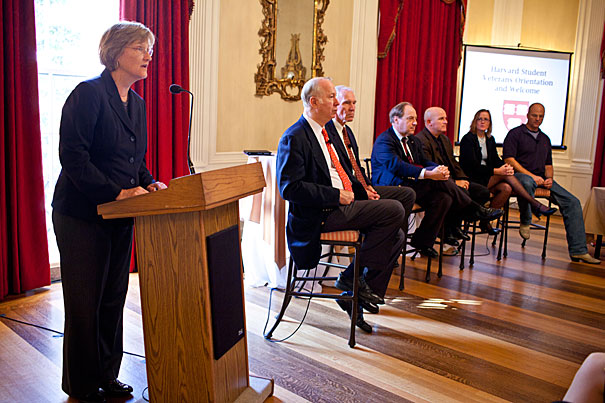
“As soldier-scholars you will shape the future not only of Harvard but also the world,” said President Drew Faust during Harvard’s first-ever orientation for student veterans at Loeb House.
Justin Ide/Harvard Staff Photographer
Military greeting
Orientation for student veterans ‘a new tradition,’ Faust says
During World War II, Harvard turned Loeb House over to the V-12 Navy College Training Program. It was there that future officers like Jack Lemmon and Robert F. Kennedy got $50 a month to earn their undergraduate degrees.
That history made Loeb House the most likely venue for Harvard’s first-ever orientation for student veterans — “a new tradition,” President Drew Faust told the crowd of veterans on today. “We are proud to welcome you to the Harvard family.” The University has more than 250 students and fellows who are veterans, or are still on active duty.
Faust quoted Gen. David Petraeus, who at a Harvard commissioning ceremony in 2009 said, “The most powerful tool any soldier carries is not his weapon but his mind.”
She added, “As soldier-scholars you will shape the future not only of Harvard but also the world.”
A panel of faculty members and policymakers — all of them veterans — rolled out a welcome. They urged veterans at Harvard to share their experiences and study hard.
Introducing the panel, Harvard Kennedy School (HKS) Dean David T. Ellwood praised the group. “You made a decision to put your life on the line … when surely you had other choices,” he said. “You bring a remarkable perspective very few people on this campus have.”
Moderating the panel was Meghan O’Sullivan, Kirkpatrick Professor of the Practice of International Affairs and, as deputy national security adviser for Iraq and Afghanistan, one of the Bush administration architects of the “surge” strategy.
David Gergen, director of the Center for Public Leadership at HKS, recalled a recent trip with then-Secretary of Defense Robert Gates, who was concerned about a widening gap between civilian and military cultures. “You can help us close this gap,” Gergen told the audience.
Developing personal relationships at Harvard is an important part of becoming soldier-scholars, Gergen said, adding: “Do crack the books while you are here. It’s a time to go deeper.”
Kevin Kit Parker — both a major in the Army and Harvard’s Tarr Family Professor of Bioengineering and Applied Physics — joined the panel just a few days after returning from a tour in Afghanistan. In jeans and a polo shirt, he was dressed for the barbecue to follow on the lawn outside Loeb House. But Parker was ready to deliver perspective, too. The new students and fellows are joining a “long crimson line” of Harvard veterans, he said — and perhaps will find similarities between life in the military and at the University. “The 18-to-30 demographic is the engine [in both institutions]. It’s how things get done,” said Parker.
On the other hand, a “bureaucratic, incomprehensible Harvard does exist,” said Vietnam-era Army veteran Harry Lewis, who is Gordon McKay Professor of Computer Science. “But … at its best Harvard operates like a family.” He then gave the audience his email address.
Scott Snook, the MBA Class of 1958 Senior Lecturer of Business Administration, described his path to Harvard as a journey from “the West Point on the Hudson to the West Point of capitalism.” The military provides leadership lessons, said the 22-year Army veteran, but Harvard will too — including the idea that it sometimes requires self-disclosure and deep inquiry into other people.
Panelist Monica Duffy Toft, an associate professor of public policy at HKS, is a self-described “child soldier,” who joined the Army at 17, served as a Russian linguist, and was out of the service by 21 — with a vivid appreciation of the value of divergent experiences in the classroom. “You’ve seen a lot more than many of the students on campus,” she told the veterans. “You need to share that.”
Tad Oelstrom, a 35-year Air Force veteran and now director of National Security Program at HKS, reflected on the evolution of how veterans are regarded on campus compared with even 10 years ago. “Everybody here should be proud of what’s happened here,” he said.
Meanwhile, “you are being blessed with a terrific education by your nation,” said Oelstrom. “You’ve got a huge responsibility to return that on interest.”




